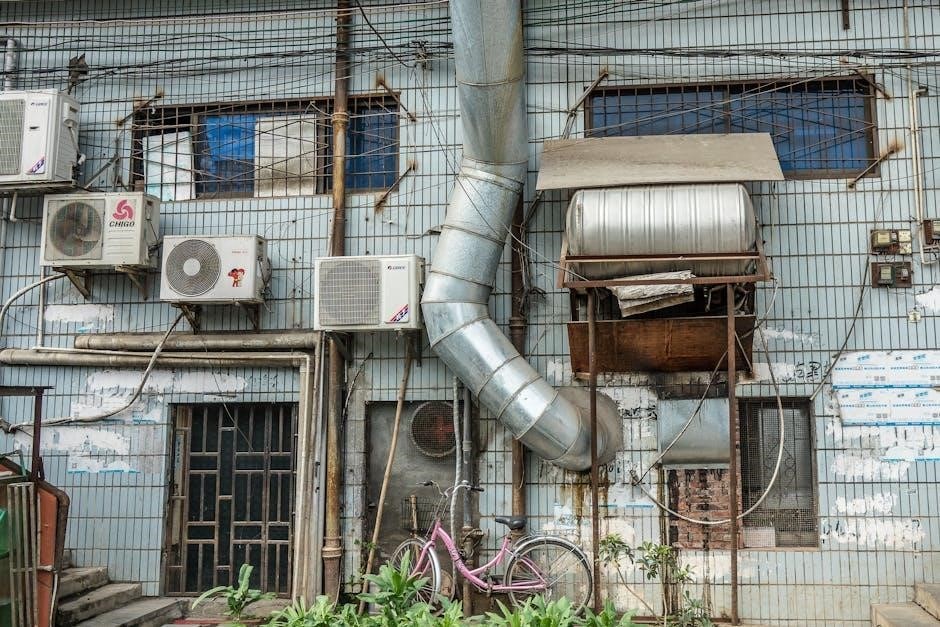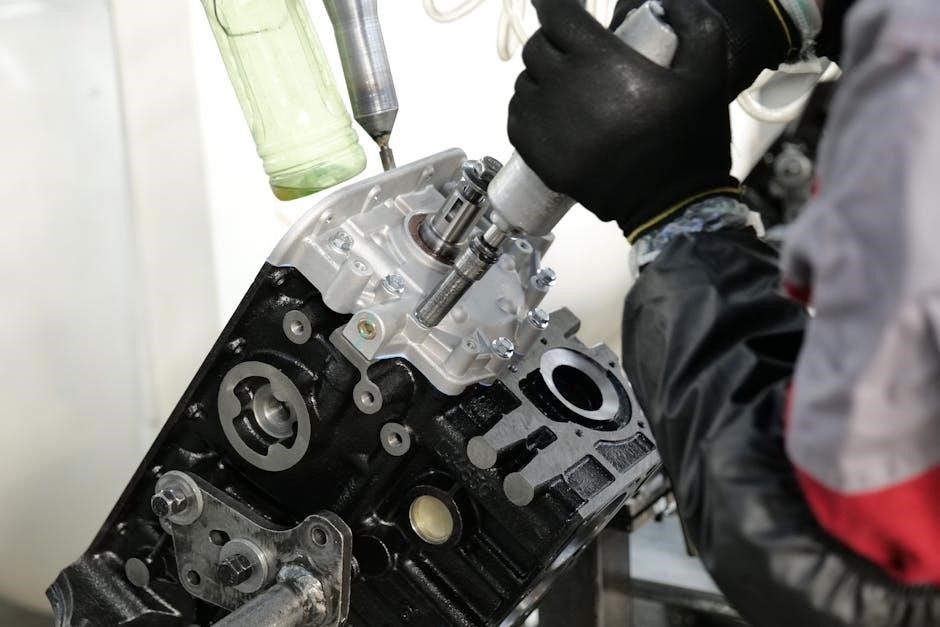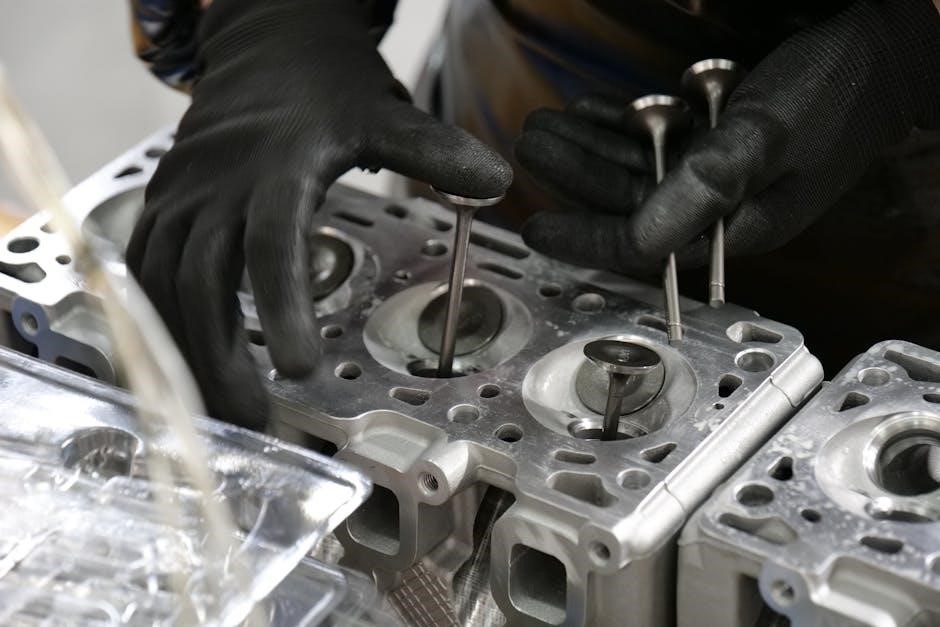An HVAC maintenance contract is an agreement between a service provider and property owner, outlining expectations and obligations for routine servicing and system maintenance․ It ensures regular check-ups, repairs, and optimal system performance, creating a legally binding relationship between both parties․
1․1 What is an HVAC Maintenance Contract?
An HVAC maintenance contract is a formal agreement between a service provider and a property owner, outlining the terms for maintaining heating, ventilation, and air conditioning systems․ It specifies the scope of work, including routine inspections, repairs, and replacements, ensuring optimal system performance․ The contract establishes a legally binding relationship, detailing responsibilities, payment terms, and service schedules․ Such agreements are customizable to meet residential or commercial needs, ensuring systems operate efficiently and effectively․ They often include provisions for emergency services and priority support, providing peace of mind for property owners․
1․2 Importance of HVAC Maintenance Contracts
HVAC maintenance contracts are essential for ensuring the longevity and efficiency of heating, ventilation, and air conditioning systems․ They provide a structured plan for routine inspections, cleaning, and repairs, preventing unexpected breakdowns and costly damages․ By scheduling regular maintenance, property owners can reduce energy consumption, lower utility bills, and extend the lifespan of their HVAC systems․ These contracts also offer legal protection for both parties, outlining clear responsibilities and expectations․ Ultimately, they ensure systems operate at peak performance, providing consistent comfort and minimizing disruptions, making them a vital investment for homeowners and businesses alike․

Types of HVAC Maintenance Contracts
HVAC maintenance contracts are available in two primary types—residential and commercial․ Residential contracts cover home systems, while commercial contracts handle larger, complex systems for businesses․
2․1 Residential HVAC Maintenance Contracts
Residential HVAC maintenance contracts are designed for homeowners, ensuring regular servicing of heating, ventilation, and air conditioning systems․ These agreements typically include semi-annual check-ups and maintenance to ensure optimal performance․ They often cover repairs and replacements of worn parts, and may include priority service during emergencies․ Homeowners benefit from fixed fees, reducing unexpected costs and ensuring system reliability․ These contracts are usually valid for a specific period, such as one year, and outline the scope of work and payment terms․ By signing such a contract, homeowners can enjoy peace of mind knowing their HVAC system is well-maintained and energy-efficient throughout the year․
2․2 Commercial HVAC Maintenance Contracts
Commercial HVAC maintenance contracts are agreements tailored for businesses, ensuring their heating, ventilation, and air conditioning systems operate efficiently․ These contracts typically cover routine inspections, repairs, and maintenance to prevent downtime and ensure optimal performance․ They often include priority service, emergency repairs, and customized maintenance plans based on the business’s specific needs․ Commercial contracts may involve more complex systems and larger equipment, requiring specialized expertise․ The agreements outline the scope of work, payment terms, and service schedules, helping businesses maintain a comfortable environment while reducing unexpected repair costs and ensuring system reliability throughout the year․

Benefits of HVAC Maintenance Contracts
HVAC maintenance contracts offer improved system efficiency, reduced energy costs, and extended equipment lifespan․ Regular servicing prevents unexpected breakdowns, ensuring consistent performance and reliability for property owners․
3․1 Benefits for Homeowners
An HVAC maintenance contract provides homeowners with consistent system performance, reduced energy bills, and extended equipment lifespan․ Regular check-ups prevent unexpected breakdowns, ensuring reliable heating and cooling․ Homeowners benefit from priority service, discounted rates, and peace of mind knowing their system is well-maintained․ These contracts often include routine inspections, filter replacements, and tune-ups, which enhance indoor air quality and comfort․ By addressing issues early, homeowners avoid costly repairs and maintain optimal system efficiency․ This proactive approach ensures their HVAC system operates smoothly year-round, providing long-term savings and reliability․
3․2 Benefits for Businesses
HVAC maintenance contracts offer businesses consistent system performance, minimizing downtime and ensuring a comfortable environment for employees and customers․ Regular servicing prevents unexpected breakdowns, reducing operational disruptions․ Businesses benefit from priority service, discounted rates, and extended equipment lifespan․ These contracts often include routine inspections, filter replacements, and tune-ups, enhancing indoor air quality and system efficiency․ By addressing issues early, businesses avoid costly repairs and maintain optimal performance․ This proactive approach ensures their HVAC system operates smoothly, supporting productivity and customer satisfaction while minimizing unexpected expenses and ensuring compliance with health and safety standards․

Key Components of an HVAC Maintenance Contract
An HVAC maintenance contract typically includes the scope of work, payment terms, service schedules, and legal clauses․ It outlines responsibilities, ensures system efficiency, and provides a clear agreement framework․
4․1 Scope of Work
The scope of work in an HVAC maintenance contract outlines the specific services provided, such as routine inspections, filter changes, duct cleaning, and repairs․ It defines the frequency of visits, the types of systems covered, and the extent of maintenance tasks․ This section ensures clarity on what is included, preventing disputes and setting clear expectations․ It may also specify whether emergency services are covered and how they are handled․ Customization is key, allowing the agreement to align with the property’s unique HVAC needs․ A well-defined scope ensures both parties understand their responsibilities, promoting a smooth and professional relationship․ Regular updates may be necessary to reflect system changes or new requirements․
4․2 Payment Terms and Schedules
Payment terms and schedules in an HVAC maintenance contract detail the financial obligations, including the amount, method, and timing of payments․ This section specifies whether payments are due monthly, quarterly, or annually and outlines accepted payment methods․ It may also include late fees or penalties for missed payments․ The schedule aligns with the frequency of services provided, ensuring transparency and mutual understanding․ This clarity helps avoid disputes and ensures both parties adhere to their financial responsibilities․ The terms may also allow for adjustments based on service frequency or additional repairs, providing flexibility to meet the client’s needs․ Proper documentation ensures accountability for all transactions․
How to Choose the Right HVAC Maintenance Contract
Evaluating service providers, understanding contract terms, and customizing agreements to meet specific needs are key steps in selecting the right HVAC maintenance contract․
5․1 Evaluating Service Providers
Evaluating HVAC service providers involves assessing their professionalism, reputation, and experience․ Look for licensed technicians with a proven track record of reliable service․ Check customer reviews and ask for references to ensure credibility․ Compare service offerings, response times, and emergency availability to meet your specific needs․ Cost is a key factor, but prioritize quality and transparency in pricing․ Ensure the provider offers customizable maintenance plans tailored to your HVAC system․ Verify their insurance and certifications to avoid potential liabilities․ A thorough evaluation ensures you partner with a trustworthy provider who can deliver consistent, high-quality maintenance services․ This step is crucial for a satisfactory long-term partnership․
5․2 Understanding Contract Terms
Understanding the terms of an HVAC maintenance contract is essential for a clear agreement between parties․ Review the scope of work to ensure it covers necessary services like routine inspections and repairs․ Payment terms should outline schedules, methods, and potential late fees․ Check for exclusions or limitations, such as parts not covered under the contract․ Termination clauses and dispute resolution processes are also critical to avoid misunderstandings․ Ensure the contract specifies response times and emergency procedures․ Digital signatures can streamline the agreement process, offering legal validity and convenience․ Carefully reviewing these details ensures transparency and protects both the service provider and the client․ This step prevents future conflicts and ensures smooth service delivery․
Tips for Creating an HVAC Maintenance Contract
Clearly define the scope of services, payment terms, and termination clauses․ Specify responsibilities and ensure legal compliance․ Use templates and customize as needed for clarity and fairness․
6․1 Using Templates
Using pre-designed HVAC maintenance contract templates simplifies the creation process, ensuring all essential elements are included․ Templates from platforms like Jotform or PandaDoc provide customizable frameworks, saving time and reducing errors․ They often include sections for scope of work, payment terms, and termination clauses, allowing for easy adaptation to specific needs․ Templates also help maintain consistency and professionalism, ensuring legal compliance․ By leveraging these tools, service providers can focus on delivering quality services while presenting clear, structured agreements to clients․ This approach streamlines contract creation and enhances client trust through professional documentation․
6․2 Customizing the Agreement
Customizing an HVAC maintenance contract ensures it aligns with specific client needs and service provider requirements․ Platforms like Jotform and PandaDoc offer editable templates, allowing users to tailor clauses, service details, and payment terms․ This flexibility enables providers to highlight unique offerings, such as priority service or emergency repairs; Customization also ensures clarity and transparency, reducing misunderstandings․ By incorporating branding elements like logos and contact information, agreements appear professional and personalized․ Regular updates to reflect changing client needs or legal requirements further enhance the contract’s effectiveness and ensure compliance with local regulations․
Common Mistakes to Avoid
Overlooking key clauses and not reading the fine print are common mistakes․ Ensure all terms, including payment schedules and service scopes, are clearly understood to avoid disputes or compliance issues․
7․1 Overlooking Key Clauses
Overlooking key clauses in an HVAC maintenance contract can lead to misunderstandings and legal issues․ Essential clauses include payment terms, scope of work, termination conditions, and dispute resolution․ Neglecting these details can result in unforeseen costs or service gaps․ Always review the contract thoroughly to ensure all critical aspects are addressed․ Pay attention to clauses regarding emergency repairs, response times, and equipment warranties․ Clearly defined obligations for both parties are crucial to avoid disputes․ A well-drafted contract protects both the service provider and the client, ensuring smooth service delivery and accountability․ Careful review prevents future complications and ensures mutual satisfaction․
7․2 Not Reading the Fine Print
Not reading the fine print in an HVAC maintenance contract can lead to hidden costs, unexpected terms, or misunderstood obligations․ It’s crucial to carefully review clauses related to payment terms, service limitations, and termination policies․ Overlooking details like response times, emergency fees, or exclusions can result in financial surprises․ Always ensure you understand all conditions before signing․ Pay attention to cancellation policies and renewal terms to avoid being locked into unfavorable agreements․ Taking the time to read and understand the fine print helps prevent disputes and ensures the contract aligns with your needs and expectations․

Legal Considerations
HVAC maintenance contracts must comply with local laws and regulations․ They establish clear contractual obligations, ensuring both parties understand their responsibilities and rights․ Legal considerations include dispute resolution processes, liability clauses, and compliance with industry standards․ Proper documentation and digital signatures can ensure the contract’s validity․ It’s essential to consult legal experts to avoid potential disputes and ensure all terms align with applicable laws․ A well-drafted contract protects both the service provider and the client, providing a clear framework for resolving issues and upholding professional standards․
8․1 Contractual Obligations
HVAC maintenance contracts outline the mutual expectations and responsibilities of both the service provider and the client․ Contractual obligations ensure clarity on the scope of work, payment terms, and service frequency․ These agreements detail the provider’s duties, such as routine inspections and repairs, while specifying the client’s responsibilities, like timely payments and providing access to the system․ Liability clauses and warranties are also included to protect both parties․ The contract must comply with local laws, ensuring enforceability and fairness․ Clear obligations help prevent disputes and ensure all parties fulfill their commitments as agreed upon in the legally binding document․
8․2 Dispute Resolution
Dispute resolution clauses in HVAC maintenance contracts outline procedures for addressing conflicts between the service provider and client․ These clauses often include mediation, arbitration, or litigation processes to resolve disagreements amicably․ They ensure that disputes are handled efficiently, minimizing interruptions to service and maintaining the business relationship․ Clear resolution methods help prevent escalations and provide a structured approach to resolving issues fairly․ By including these terms, both parties can address potential conflicts without delaying necessary maintenance or repairs, ensuring the HVAC system remains operational and any disputes are resolved promptly and professionally․

Digital Signatures and HVAC Contracts
Digital signatures simplify HVAC contract management by enabling electronic approvals, reducing paperwork, and accelerating agreement processes․ Platforms like Jotform offer e-signature tools for seamless contract execution, ensuring legality and convenience․
9․1 E-Signature Platforms
E-signature platforms like Jotform and PandaDoc simplify HVAC contract management by offering digital tools for creating, sharing, and signing maintenance agreements․ These platforms provide customizable templates, enabling service providers to draft professional contracts quickly․ Features include electronic signature collection, automated email sharing, and secure storage of signed documents․ They support PDF formats, making it easy to download and print agreements․ E-signature platforms ensure legality, convenience, and efficiency for both contractors and clients, streamlining the contracting process and reducing paperwork․
9․2 Legal Validity of Digital Signatures
Digital signatures on HVAC maintenance contracts are legally valid under the E-Sign Act and eIDAS regulations, ensuring enforceability in court․ Platforms like Jotform and PandaDoc use encrypted technology to authenticate signatures, providing a secure and legally binding process․ These signatures are recognized globally, offering a reliable method for contractors and clients to agree on terms․ The use of digital signatures streamlines the contracting process, reduces paperwork, and ensures compliance with legal standards․ This modern approach enhances trust and efficiency, making it a preferred method for HVAC service agreements․

HVAC Maintenance Contract Templates
HVAC maintenance contract templates are pre-designed documents offering a structured framework for outlining service agreements․ Available online, they can be downloaded in PDF or Word formats, ensuring customization to suit specific needs and providing clear terms for both parties involved․
10․1 Free Templates Available Online
Free HVAC maintenance contract templates are readily available online, offering a cost-effective solution for creating professional agreements․ Platforms like Jotform, PandaDoc, and ServiceTitan provide customizable templates in PDF and Word formats․ These templates include essential elements such as scope of work, payment terms, and service schedules, ensuring clarity and legal validity․ Users can easily download and adapt them to fit specific business or residential needs, saving time and resources․ They are ideal for service providers aiming to streamline contract creation and ensure seamless customer agreements․ These templates are widely accessible and designed to meet industry standards, making them a practical choice for HVAC professionals․
10․2 Customizable PDF Templates
Customizable PDF templates for HVAC maintenance contracts offer flexibility and convenience․ These templates allow users to modify terms, pricing, and service details to suit specific needs․ Platforms like Jotform and PandaDoc provide editable PDFs that can be tailored to include company branding, service descriptions, and legal clauses․ They often support digital signatures, streamlining the agreement process․ Customizable PDF templates ensure professional and consistent contracts while saving time․ They are ideal for businesses needing to adapt agreements for various clients or services, ensuring clarity and compliance with industry standards․ This approach enhances efficiency and customer satisfaction in HVAC maintenance contracting․
How to Manage Multiple Contracts
Managing multiple HVAC contracts requires organization and digital tools․ Use platforms like Jotform or ServiceTitan to track agreements, set reminders, and centralize contract information for easy access․
11․1 Organizing Contracts
Organizing HVAC maintenance contracts involves creating a structured system to store and manage agreements․ Using digital tools like Jotform or ServiceTitan can help centralize contracts, ensuring easy access and retrieval․ Categorize contracts by type, such as residential or commercial, and maintain separate folders for active and expired agreements․ Implementing a cloud-based storage solution allows teams to access contracts remotely and share them securely․ Regularly review and update contract details to ensure accuracy․ Setting reminders for renewal dates and termination periods is crucial for maintaining compliance and avoiding lapses in service coverage․
Using templates and standardized formats simplifies the organization process, reducing errors and saving time․ Prioritize contracts based on priority levels or client importance to streamline workflows․ Assign responsibilities for contract management to ensure accountability and consistency․ This systematic approach enhances efficiency, reduces administrative burdens, and ensures all agreements are up-to-date and easily accessible when needed․
11․2 Tracking Expiration Dates
Tracking expiration dates of HVAC maintenance contracts is essential for ensuring continuous service and avoiding lapses in coverage․ Use digital tools or calendars to monitor renewal deadlines, setting reminders for timely action․ Automated reminders from platforms like Jotform or ServiceTitan can alert stakeholders about upcoming expirations․ Regularly review contracts to identify nearing expiration dates and plan renewal strategies․ This proactive approach prevents unplanned downtime and ensures seamless service continuation․ Maintaining a centralized tracking system helps organizations stay organized and compliant, avoiding potential legal or operational issues related to expired agreements․

Renewal and Termination
An HVAC maintenance contract outlines renewal processes and termination clauses, ensuring smooth transitions․ Automatic renewal or notice periods are common, while termination clauses protect both parties’ rights and obligations․
12․1 Renewal Process
The renewal process for an HVAC maintenance contract typically involves automatic renewal unless terminated by either party within a specified notice period․ Contracts often include terms for annual or multi-year renewals, ensuring continuous service without interruptions․ The renewal process is designed to be straightforward, with clear guidelines outlined in the agreement․ Both parties are generally required to agree to renewal terms, which may include updated pricing or service details․ Proper documentation and communication are essential to ensure a smooth transition into a new contract term, maintaining the ongoing relationship between the service provider and the client․
12․2 Termination Clauses
Termination clauses in HVAC maintenance contracts outline the conditions under which either party can end the agreement; These clauses typically include mutual agreement, breach of contract, or convenience-based termination․ Notice periods, often 30 or 60 days, are specified to allow either party to terminate the contract․ Termination clauses also address payment obligations, ensuring any outstanding fees are settled․ They are designed to protect both parties by providing clear exit strategies and avoiding disputes․ Properly drafted termination clauses ensure a smooth end to the agreement if needed, maintaining a professional relationship between the service provider and the client․

Case Studies and Examples
Real-world examples demonstrate how HVAC maintenance contracts ensure system efficiency and cost savings․ A coal miner’s renewal with Booyco Engineering and a homeowner’s structured agreement highlight success․
13․1 Successful Contract Implementations
Case studies highlight the effectiveness of HVAC maintenance contracts in ensuring system performance and cost savings․ For instance, a South African coal miner renewed a maintenance contract with Booyco Engineering, ensuring equipment uptime and operational efficiency․ Similarly, a residential agreement covering semi-annual HVAC check-ups resulted in extended system lifespan and reduced repair costs․ These examples demonstrate how structured contracts foster long-term partnerships, prioritize preventive maintenance, and align with client needs․ They also showcase the importance of clear terms and digital platforms like Jotform and PandaDoc in managing agreements efficiently․ Such implementations underscore the value of HVAC contracts in maintaining system health and customer satisfaction․
13․2 Real-World Scenarios
Real-world scenarios demonstrate how HVAC maintenance contracts effectively manage system upkeep․ For example, a South African coal miner extended a contract with Booyco Engineering, ensuring continuous equipment operation․ Residential agreements, like one covering semi-annual HVAC check-ups, have proven to extend system lifespan and reduce unexpected repair costs․ These scenarios highlight the practical benefits of structured maintenance plans, such as prioritized service and transparent terms; They also illustrate how digital platforms like Jotform and PandaDoc simplify agreement management, ensuring compliance and customer satisfaction․ Such real-world applications emphasize the importance of tailored contracts in maintaining system efficiency and building trust between providers and clients․

Future Trends in HVAC Maintenance Contracts
Future HVAC maintenance contracts may incorporate smart contract technology for automated, efficient processes and emphasize sustainability initiatives, promoting eco-friendly practices and energy efficiency․
14․1 Smart Contract Technology
Smart contract technology is revolutionizing HVAC maintenance contracts by automating agreements through blockchain․ These self-executing contracts ensure transparent, tamper-proof transactions, eliminating the need for intermediaries․ They can automatically trigger payments or service schedules based on predefined conditions, enhancing efficiency and reliability․ By integrating IoT sensors, smart contracts can monitor system performance in real-time, enabling proactive maintenance and reducing downtime․ This innovation streamlines operations, minimizes disputes, and ensures compliance with contractual obligations․ The adoption of smart contracts is expected to increase trust and scalability in HVAC maintenance agreements, making them more appealing to both service providers and clients․
14․2 Sustainability Initiatives
Sustainability initiatives are becoming integral to HVAC maintenance contracts, focusing on energy efficiency and environmental impact reduction․ Many contracts now include provisions for upgrading to energy-efficient systems, promoting the use of renewable energy sources, and ensuring regular maintenance to optimize performance․ These initiatives align with global efforts to reduce carbon footprints and promote eco-friendly practices․ By incorporating sustainability into HVAC contracts, businesses can lower operational costs, comply with environmental regulations, and enhance their reputation as responsible entities․ This trend is expected to grow, encouraging greener technologies and practices within the HVAC industry․
An HVAC maintenance contract ensures your system is well-maintained, outlining clear expectations and obligations for both parties․ It provides a legally binding agreement for consistent service and optimal performance․
15․1 Final Thoughts
An HVAC maintenance contract is a smart investment for both homeowners and businesses, ensuring system efficiency and longevity․ By outlining clear expectations and obligations, it fosters trust between service providers and clients․ With readily available templates and digital tools, creating and managing these agreements is now more accessible than ever․ Emphasizing regular maintenance and timely repairs, these contracts help prevent costly issues and promote energy savings․ Whether you’re a residential or commercial user, an HVAC maintenance contract is essential for preserving your system’s performance and extending its lifespan․ It’s a practical solution for modern heating, ventilation, and cooling needs;
15․2 Next Steps
After understanding the importance and structure of HVAC maintenance contracts, the next step is to research reputable service providers and compare their offerings․ Review contract templates to ensure they align with your specific needs, whether residential or commercial․ Seek legal advice to verify the agreement’s validity and understand your obligations․ Once satisfied, proceed to sign the contract and schedule maintenance visits․ Regularly review and update the agreement to reflect any changes in your system or service requirements․ This proactive approach ensures your HVAC system remains efficient, reliable, and well-maintained for years to come, safeguarding your investment and comfort․